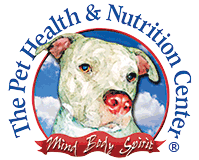Pet Health Tip - Omega Fatty Acids
There is a lot of confusion about omega fatty acids. All too often they are referred to as “essential fatty acids”. However, “essential” should only be used when discussing alpha-linolenic acid (ALA) (an omega-3 fatty acid) and linoleic acid (LA) (an omega-6 fatty acid). These two fatty acids are referred to as “essential” because they must be ingested as the body can not synthesize them itself.
Alpha-linolenic acid (ALA) is found in vegetable oils and nuts (especially walnuts), flax seeds, leafy vegetables, and some animal fat, especially in grass-fed animals. The body generally uses ALA for energy while also benefitting the skin, cardiovascular system and helping to reduce inflammation. ALA is then converted into eicosapentaenoic acid (EPA) and docosahexaenoic acid (DHA) by the body. This process is believed to be limited, but sufficient, in healthy humans, dogs and cats. It is even better when dogs and cats ingest organs and glands from grass-fed animals rich in EPA and DHA.
Linoleic acid (LA) is primarily found in vegetable oils and the vegetables and seeds associated with these oils such as corn. The body converts this EFA into Gamma-Linolenic Acid (GLA), then Dihomo-Gamma-Linolenic Acid (DGLA) and then further into arachidonic acid (AA) (found in meat and dairy products). This cascade is generally pro-inflammatory. However, improving the ratio of omega-3 to omega-6 fatty acids in the diet, by providing ALA, will help the GLA to become more anti-inflammatory and help to limit the effects of the pro-inflammatory arachidonic acid.
What Should I Do?
Both omega-3 and omega-6 fatty acids are important for the normal function of the body. However, because the diet of humans, dogs and cats is generally high in processed foods and/or meat from animals fed an inflammatory feed like corn, every one of us can benefit from supplementation with omega-3 fatty acids. We recommend Chia Seed Oil (the plant kingdoms best source of the essential omega-3 fatty acid ALA) because there are organic sources available and it is an environmentally sustainable choice. For healthy individuals, natural conversion of ALA to the longer chain omega-3s, DHA and EPA, is generally sufficient to maintain healthy tissue function. If EPA and DHA are your primary focus then a fish oil supplement can be added.

